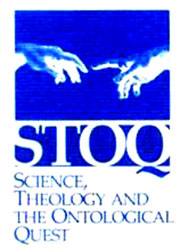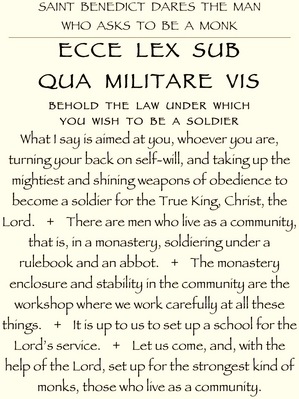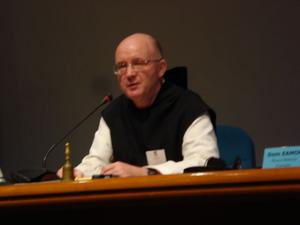Meeting at the beautiful upper eastside church of Our Lady of Good Counsel (NYC), on a very rainy Saturday night, the Catholic Underground convened. There is no exaggeration in saying that nearly 500 people, mostly in their 20s and 30s but there were the more mature individuals who may claim to be in their 40s, 50s and above, present to pray Vespers (the Roman Office) in the presence of the exposed Blessed Sacrament and then to spend time adoring Christ. The ceremony was presided over by the newly ordained deacon, Brother Louis, CFR.
 The Catholic Underground is in its 6th season and it meets on the first Saturday of each month, nine times a year. The Underground is a religious and cultural project of the Franciscan Friars of the Renewal. They say the Underground exists because “the Gospel lives in conversation with culture, we must be fearless in crossing the cultural threshold of the communication and information revolution now taking place.” The Franciscan Friars of the Renewal (known to some as the CFRs or Fr. Benedict Groeshel’s group) is a Capuchin reform movement of Franciscans who live radical yet sensible poverty, who have an intense community life and who are faithful to the teaching authority of the Church. No one who meets these friars could say that they don’t live according to their Order’s charism and that they are squishy in their faith and liturgical lives. While they may not use the concept outright, the CFRs follow an ancient dictum of lex orandi, lex credendi, lex vivendi.
The Catholic Underground is in its 6th season and it meets on the first Saturday of each month, nine times a year. The Underground is a religious and cultural project of the Franciscan Friars of the Renewal. They say the Underground exists because “the Gospel lives in conversation with culture, we must be fearless in crossing the cultural threshold of the communication and information revolution now taking place.” The Franciscan Friars of the Renewal (known to some as the CFRs or Fr. Benedict Groeshel’s group) is a Capuchin reform movement of Franciscans who live radical yet sensible poverty, who have an intense community life and who are faithful to the teaching authority of the Church. No one who meets these friars could say that they don’t live according to their Order’s charism and that they are squishy in their faith and liturgical lives. While they may not use the concept outright, the CFRs follow an ancient dictum of lex orandi, lex credendi, lex vivendi.
In the crowd you saw a religious brother, 2 Sisters of Life, a woman religious of an unidentified congregation, some minor and major diocesan seminarians and a host of friars. I wasn’t aware of the presence of the secular priests or members of other religious orders. But since I was there I can claim the Benedictines were represented by me as a mere postulant.
Liturgically there was a fine sense of the ars celebrandi. Unlike some church venues, these friars follow what the Church expects; no trendy prayers, no making “it relevant,” etc. The celebrant and the musicians with the attentive crowd did what the Church expects in living the mystery in front of us. Hence, there was no liturgical innovation. One may quibble over the fact there was no homily but what exactly could have been said at that moment? The Divine Presence was really doing all the work. Perhaps someone may also raise a question of the quality (style?) of music used. Certainly, the Franciscan Steubenville style is appealing to many people under a certain age. But I wonder if that is because they know nothing else than the Steubenville music. The friars know chant and hymnody but for some reason they’ve selected the Steubenville genre thinking that it’s what “speaks to this crowd!” But they well be correct in their choices, I just don’t know right now how to judge the choice. When you hear 800-year old hymn texts set to contemporary settings your interest piques. While I suspended criticism of the Steubenville music until I experience these rites again I can’t help but think a steady diet of this trendy music would sour over time. Where does this ultimately lead the believer?
Many people were shriven. I have to laugh at the ’68ers who claim that the reception
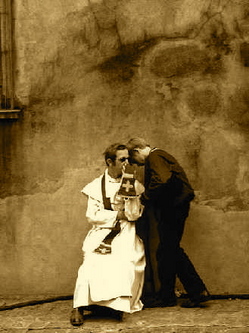 of the sacrament of Confession is dead or its reception is so low that it barely has a heart beat when I look at events like the Catholic Underground. Other experiences tell me the faithful’s reception of this sacrament is not on life-support are the steady line of sinners for daily confession at St. Mary’s and St. Stanislaus Church, New Haven, CT, the churches of St. Agnes and St Francis, NYC and at meetings of Communion & Liberation (and I am sure there are other places). The supposition made by the ’68ers is really about their lack of belief in the effective power of God’s mercy and that it is essential in “relating” to the Lord (read the Book of Psalms to see the relationship between man’s righteousness and his need to be shriven). It would also seem that this same crowd may not believe that they can forgive or be forgiven and therefore it is a farce to face God viz. human frailty. It gives me great hope to see other in line to hear God say “I love you and I forgive you; go and sin no more you are set free of your sins.” What is easier to say, your sins are forgiven or to make rationalizations about our humanity? There were at least 5 priests hearing confessions during Vespers and down in the church hall during the music event. Tell me Confession isn’t being valued and utilized today! Go ahead, tell me there isn’t an awareness of grace and sin in the lives of the young people today!
of the sacrament of Confession is dead or its reception is so low that it barely has a heart beat when I look at events like the Catholic Underground. Other experiences tell me the faithful’s reception of this sacrament is not on life-support are the steady line of sinners for daily confession at St. Mary’s and St. Stanislaus Church, New Haven, CT, the churches of St. Agnes and St Francis, NYC and at meetings of Communion & Liberation (and I am sure there are other places). The supposition made by the ’68ers is really about their lack of belief in the effective power of God’s mercy and that it is essential in “relating” to the Lord (read the Book of Psalms to see the relationship between man’s righteousness and his need to be shriven). It would also seem that this same crowd may not believe that they can forgive or be forgiven and therefore it is a farce to face God viz. human frailty. It gives me great hope to see other in line to hear God say “I love you and I forgive you; go and sin no more you are set free of your sins.” What is easier to say, your sins are forgiven or to make rationalizations about our humanity? There were at least 5 priests hearing confessions during Vespers and down in the church hall during the music event. Tell me Confession isn’t being valued and utilized today! Go ahead, tell me there isn’t an awareness of grace and sin in the lives of the young people today!
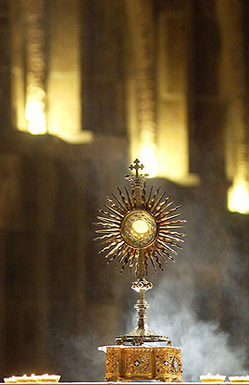 If your measure of success is pure numbers, then it was a success. A very full church of people praying and be shrived is impressive on a Saturday night. That people come to religious ceremonies is a minor miracle in some people’s books. But the standard of judgment has to be different: the measure of “success” of a gesture such as Vespers and Benediction of the Blessed Sacrament can’t rely on numbers but on sanctification. Questioning the success by numbers begs the question of participation and yet we all know that a person can participate in a religious event without opening he or her mouth. So, how can one measure how and if sanctification happens?
If your measure of success is pure numbers, then it was a success. A very full church of people praying and be shrived is impressive on a Saturday night. That people come to religious ceremonies is a minor miracle in some people’s books. But the standard of judgment has to be different: the measure of “success” of a gesture such as Vespers and Benediction of the Blessed Sacrament can’t rely on numbers but on sanctification. Questioning the success by numbers begs the question of participation and yet we all know that a person can participate in a religious event without opening he or her mouth. So, how can one measure how and if sanctification happens?
The other day I was reflecting on what happened at the Catholic Underground first by myself and later with a friend. Questions surfaced about the high level of emotions that exists among the participants. Perhaps one can say, “really!” In front of Holiness what else might there be? I knowing running through me there were the emotions of happiness, sadness, love, peace, anxiety, fear, etc. There seems to be much going on at the service: prayer -personal and congregational, conversion as evidenced by those standing in line for the sacrament of Confession, and prayerful companionship with others. Are the emotions of the participants being played by such events?
Another piece of this evaluation of the Catholic Underground is the catechetical side of the event. I wonder how all of our lives of faith can be strengthened, broadened and realized by a moment of catechesis. Perhaps our time with the exposed Eucharist is the right time for teaching the faith. I do have to wonder about the lack of catechetical materials available in the back of the Church or in the hall. Couldn’t the friars use the free materials from the Catholic Information Service (at the Knights of Columbus)? Surely Underground-ers would appreciate knowing about the print and audio materials available to better know their faith?
Catholic identity is fostered and deepened even though notions of identity may not be considered by the participants but participation in such things sets the participants apart from their secular and other religiously oriented friends. What do these people know about the faith? Are they conscious of the event of the Paschal Mystery? Are they aware that congregational praying builds a relationship with God and strengthens fraternal relations with those in attendance? What happens to this people from one Catholic Underground experience and the next Catholic Underground experience? How many come back in a given year?
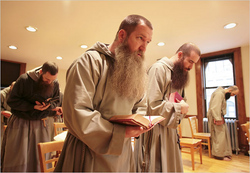 One thing is crystal clear: the credibility of the Franciscan Friars of the Renewal is rock solid. There is no question in my mind that the friars are convicted by their encounter with Christ as Savior and the Church as sacrament. The friars, unlike so many other religious, are not ashamed by their faith in Christ, their religious profession and for those who are priests, their priesthood. AND that’s why the CFRs are getting vocations. In seeing the friars at work, I am trying to imagine a full complement of priests who really love their calling to be priests of Jesus Christ and a group of priests who are not afraid of being collaborators with the bishops in serving as priests for good of the Gospel and the Church. Is this too much to ask for? Of course, there are priests who love Christ, who love the Church and love being ordained, but they seem to be few in number.
One thing is crystal clear: the credibility of the Franciscan Friars of the Renewal is rock solid. There is no question in my mind that the friars are convicted by their encounter with Christ as Savior and the Church as sacrament. The friars, unlike so many other religious, are not ashamed by their faith in Christ, their religious profession and for those who are priests, their priesthood. AND that’s why the CFRs are getting vocations. In seeing the friars at work, I am trying to imagine a full complement of priests who really love their calling to be priests of Jesus Christ and a group of priests who are not afraid of being collaborators with the bishops in serving as priests for good of the Gospel and the Church. Is this too much to ask for? Of course, there are priests who love Christ, who love the Church and love being ordained, but they seem to be few in number.
In the post John Paul II pontificate and now in the Benedict XVI pontificate orthodoxy is a value by which you live and die. There are those who were once called “JPII Catholics” are now “B16 protagonists.” That is, looking at and following the example of Pope Benedict XVI you get the strong sense that a right-thinking, right-praying Catholic today is one who is making a difference the public and private squares.
That’s it for now.






